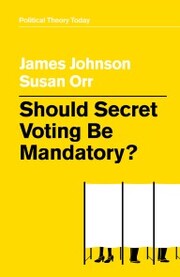Detailansicht
Should Secret Voting Be Mandatory?
eBook - Political Theory Today
ISBN/EAN: 9781509538171
Umbreit-Nr.: 250324
Sprache:
Englisch
Umfang: 140 S., 0.15 MB
Format in cm:
Einband:
Keine Angabe
Erschienen am 10.11.2020
Auflage: 1/2020
E-Book
Format: EPUB
DRM: Adobe DRM
- Zusatztext
- The secrecy of the ballot, a crucial basic element of representative democracy, is under threat. Attempts to make voting more convenient in the face of declining turnout and the rise of the ballot selfie are making it harder to guarantee secrecy.<p>Leading scholars James Johnson and Susan Orr go back to basics to analyze the fundamental issues surrounding the secret ballot, showing how secrecy works to protect voters from coercion and bribery. They argue, however, that this protection was always incomplete: faced with effective ballot secrecy, powerful actors turned to manipulating turnout buying presence or absence at the polls to obtain their electoral goals. The authors proceed to show how making both voting and voting in secret mandatory would foreclose both undue influence and turnout manipulation. This would enhance freedom for voters by liberating them from coercion or bribery in their choice of both whether and how to vote.</p> This thought-provoking and insightful text will be invaluable for students and scholars of democratic theory, elections and voting, and political behavior.
- Kurztext
- The secrecy of the ballot, a crucial basic element of representative democracy, is under threat. Attempts to make voting more convenient in the face of declining turnout &ndash; and the rise of the &ldquo;ballot selfie&rdquo; &ndash; are making it harder to guarantee secrecy. Leading scholars James Johnson and Susan Orr go back to basics to analyze the fundamental issues surrounding the secret ballot, showing how secrecy works to protect voters from coercion and bribery. They argue, however, that this protection was always incomplete: faced with effective ballot secrecy, powerful actors turned to manipulating turnout &ndash; buying presence or absence at the polls &ndash; to obtain their electoral goals. The authors proceed to show how making both voting and voting in secret mandatory would foreclose both undue influence and turnout manipulation. This would enhance freedom for voters by liberating them from coercion or bribery in their choice of both whether and how to vote. This thought-provoking and insightful text will be invaluable for students and scholars of democratic theory, elections and voting, and political behavior.
- Autorenportrait
- <b>James Johnson</b> is Professor of Political Science at the University of Rochester.<br /><b>Susan Orr</b> is Associate Professor of Political Science at the College of Brockport, State University of New York.
